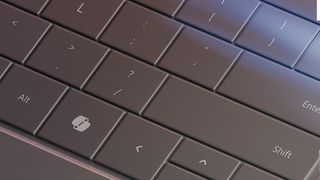Microsoft announces "most significant change to the Windows keyboard" in 30 years — adds dedicated AI Copilot key to all future PCs
New Windows PCs going forward will include a dedicated AI key on the keyboard deck.

What you need to know
- Microsoft has announced that upcoming Windows PCs will be equipped with a dedicated Copilot key.
- The Copilot key will act as a shortcut for opening the Windows Copilot interface, which launched late last year.
- The first PCs with the Copilot key will be announced at CES 2024 next week.
Microsoft has announced what it's calling the "first significant change to the Windows PC keyboard in nearly three decades," with the introduction of a new dedicated Windows Copilot AI hardware key that will ship on upcoming Windows devices starting next month.
Yusef Mehdi, Executive Vice President & Consumer Chief Marketing Officer at Microsoft says the company is preparing to usher in an era of more personal and intelligent computing driven by AI experiences, which will be seamlessly woven into Windows across OS, apps, and silicon.
In fact, the company says 2024 will be the year of the "AI PC." To double down on this idea, it's introducing the Windows Copilot key which will begin shipping on new Windows PCs starting in February. The first PCs with this new key are expected to be announced as soon as next week at CES 2024.
Microsoft does confirm that future Surface PCs will also include the new Copilot key, but no new Surface hardware announcements are being made today. We expect that the next Surface PCs will be the Surface Pro 10 and Surface Laptop 6, with next-gen Intel and Arm chips, and a new design for the Surface Laptop line.
These new AI PCs will have that dedicated Copilot key on the keyboard, in most cases positioned on the right side of the keyboard where the context menu key is usually situated. Microsoft tells me that this new Copilot key will be made mandatory for OEMs shipping Windows PCs at some point in the near future.
Microsoft says the Copilot key will make it easy for users to invoke the Windows Copilot interface, which we noted began showing up for most people in our Windows 11 version 23H2 review last year. For users who don't have Copilot enabled, the Copilot key will simply open Windows Search.
Windows and AI are about to become a lot more intertwined

Microsoft is gearing up to ship a major Windows update later this year that will primarily focus on delivering "next-gen" AI experiences across Windows. In today's blogpost, Yusef Mehdi even teases that this is what Microsoft is working on for 2024:
"... we will be ushering in a significant shift toward a more personal and intelligent computing future where AI will be seamlessly woven into Windows from the system, to the silicon, to the hardware."
Microsoft has very big plans for AI in Windows this year, including a new AI Explorer that will make searching for apps and files incredibly powerful and easy, using natural language and a new user history/timeline feature to find conversations, apps, and documents that you've had on display in the past.
I've already written about some of the AI experiences you can expect to see in the next major Windows update, codenamed Hudson Valley, and it's fair to say the AI Copilot we have today is just the start. Microsoft is all in on AI, and Windows is next on Microsoft's list for an "AI upgrade."
The company says 2024 is the year of the AI PC, and this is all going to be enabled by new Windows PCs and the upcoming Windows Hudson Valley release.
Get the Windows Central Newsletter
All the latest news, reviews, and guides for Windows and Xbox diehards.

-
HelloNNNewman Are they TRYING to drive people to Linux or Mac? LOLReply
I swear that company is run by Monte Burns. The out of touch "the kids will think this is totally groovy" thinking. -
Arun Topez That's the "most significant change"??? Replacing a useful existing key with a shortcut key no one will use is not significant... they literally added an emoji/gif/special character key in recent years (which is actually useful) but they didn't consider that major, but this is?Reply
Did they not learn anything from people hating the Bixby key on Samsung devices? -
GraniteStateColin I think this is fine, assuming there's a place to put it. I am already a bit frustrated with many laptop keyboards for leaving out the menu key. I have the new Spectre x360 16", which I mostly love, except that to fit a fingerprint reader into the keyboard, it only has 1 Windows key on the left and no menu key at all. Because it also has a Hello camera, I'd rather give up the fingerprint key and gain back a menu key.Reply
Menu key for me is a constant use key for spelling corrections -- without ever taking fingers off the keyboard, I can hit it with the cursor on a red underlined word and fix. Without knowing how Windows will use this new Copilot key, it's hard to be sure, but I doubt I'll need AI as frequently as I need the menu key, but if it is highly context aware, maybe it will incorporate the features of the menu key.
(By the way, for anyone else similarly frustrated by keyboards w/o a menu key, you can get the same effect with Shift+F10. That's not as fast as hitting the menu key while typing, but still much faster than reaching for the mouse, positioning the mouse cursor, and then right clicking.) -
GraniteStateColin Reply
@Arun Topez , did Zac say this is replacing an existing key? I didn't see that in the article. On standalone keyboards, there's probably room to add it without removing anything else. Laptops would have a tougher time, but laptop manufacturers are always making their own decisions to insert non-standard keys into their keyboards anyway. Another official key could (maybe a long shot) lead to better standardization across laptop keyboards as they have less leeway to still fit everything. My current HP keyboard has a fingerprint reader and a power button (along with the fairly laptop-standard Fn key) all in the keyboard.Arun Topez said:That's the "most significant change"??? Replacing a useful existing key with a shortcut key no one will use is not significant... they literally added an emoji/gif/special character key in recent years (which is actually useful) but they didn't consider that major, but this is?
Did they not learn anything from people hating the Bixby key on Samsung devices?
On the other hand, many laptops ignore official keyboard standards anyway. Many, for example, don't include the Menu key, which I find quite frustrating, because that's a key I use almost as much the Ctrl key (and more than the Alt key).
